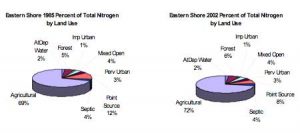VaBayBlues derives from Howard R. Ernst’s book “Chesapeake Bay Blues: Science, Politics, and the Struggle to Save the Bay” (Rowman & Littlefield, ISBN 0-7425-2351-9, 203pp). Previous books such as “Turning the Tide” by Tom Horton address the question “Why is water quality in Chesapeake Bay so abysmal?” Ernst addresses the question “Why hasn’t water quality in Chesapeake Bay improved?” This web site documents my education about the true State of the Bay and my correspondence with State and Federal officials about the causes of water Impairment and what they must do to improve water quality. The major source of pollution of Chesapeake Bay, agricultural fertilization practices, is emphasized. My focus is especially on the Coastal Plain, where I live, in Northumberland County, Virginia. A comment on the second largest source of pollution, from urban sources, is useful. Complicating scientific issues have been purposely omitted. Sadly, there are many scientists who make their living obfuscating, studying minutia and claiming importance for their findings, and/or conducting research only because funding is available to do so, a purposeful strategy manipulated by government and industry. Few people are willing to wade through the verbiage, just as few people wade through all the verbiage generated by government agencies (think Health Care Bill), which is also purposeful on the part of government.
It is the duty of independent scientists to “say it like it is” in simple and uncomplicated, yet accurate, language. Too few knowledgeable senior scientists take the time to do this, and so misinformation and overly complicated diatribes distort, muddy and anesthetize the public perception. Legitimate scientific disagreements, the driving force behind the advancement of knowledge, are magnified by special interests and spoon-fed to politicians and the public in order to avoid action under the guise of uncertainty (see “Merchants of Doubt” by Oreskes and Conway).
Many societal problems, like poor water quality in Chesapeake Bay, are well characterized and the solutions are equally clear. Knowledge is bottomless, and scientists can study anything forever. But a point is commonly reached when we know enough to reach Conclusions and act. This is the case with water quality in Chesapeake Bay.

Agriculture is the largest polluter of Chesapeake Bay and until there are significant improvements in agricultural fertilization efficiency, especially by stopping the land application of sewage sludge and poultry litter (see “Chickening Farms and Food” by EK Silbergeld), there will be no significant permanent improvement in Bay water quality. Period. Let’s not mince words. Most of the nutrients that pollute the Bay now come from fertilizers intended to grow crops but not consumed by the crop. According to Virginia Tech publication 418-016 “Nitrogen use efficiency (the % of applied Nitrogen sequestered in corn) is normally 50-60 percent but can be as high as 75 percent with proper N timing and placement.” According to EPA, about 475 million pounds of N fertilizer are purchased annually in MD, PA and VA. Let’s assume that 40% of it, 190 million pounds, ends up as pollution because Nitrogen Use Efficiency is rarely better than 60%. According to the Chesapeake Bay Program, the average Nitrogen load to the Bay is 350 million pounds. So chemical fertilizer causes a little over half of Bay Nitrogen pollution. The role of agricultural chemicals in Bay (and human) health becomes more worrisome each year (see “Whitewash: The Story of a Weed Killer, Cancer, and the Corruption of Science” by C Gillam.) Until the voices of the voters themselves, and not just their surrogates like CBF or the Sierra Club, rise above the pressure exerted on politicians by special interests (see “Poison Spring: The Secret History of Pollution and the EPA” by EG Vallianatos) and the money special interests spend legally and illegally to advance their agenda, government will not address societal problems meaningfully.